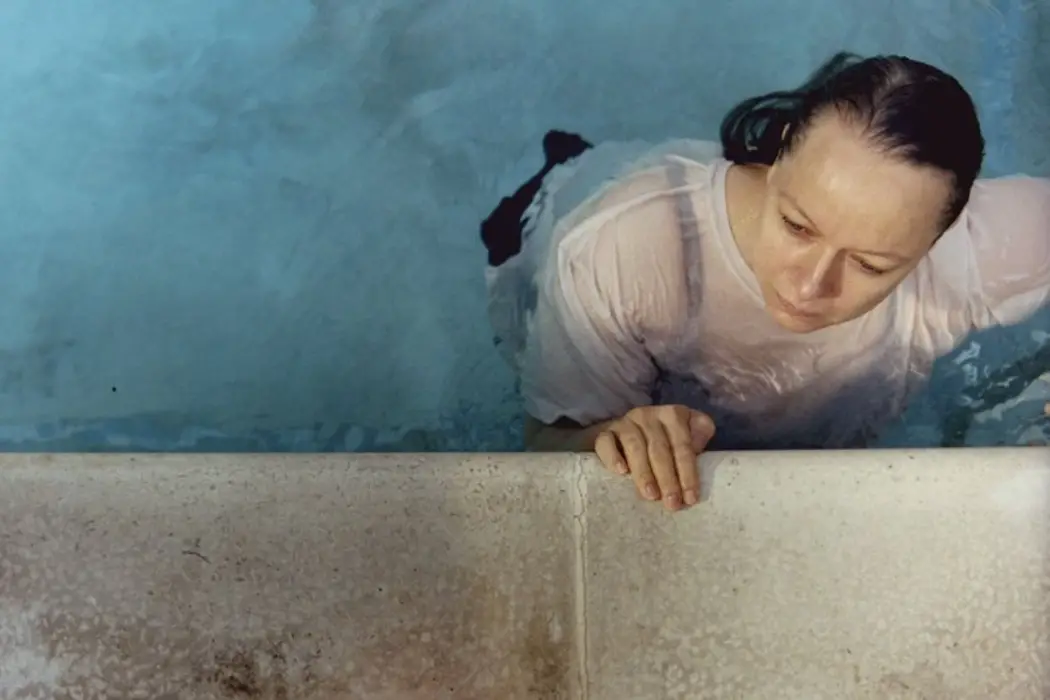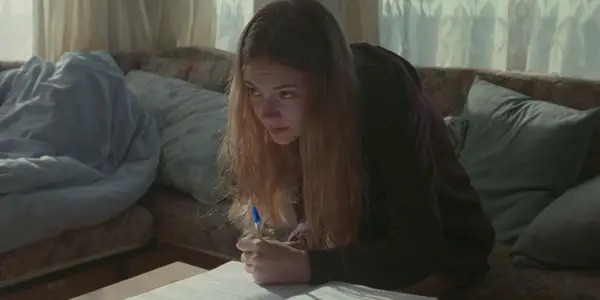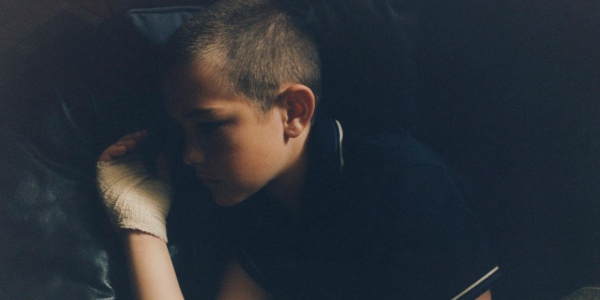TWO FOR JOY: A Mesmerising & Devastating Depiction Of Grief

Becky spends her days working in TV and she spends…
A grieving mother struggling to hold her small family together, Tom Beard‘s Two for Joy is a heartbreaking portrayal of grief, mental illness and poverty.
Beard’s first feature could easily be the celluloid child of Ken Loach and Lynne Ramsay, with a sprinkle of Gaspar Noé‘s visual style. It’s a mix which sounds absurd, but Two for Joy combines various elements which feel inspired by all of the above, with stunning results.
Starring Samantha Morton, Billie Piper and Daniel Mays, Two for Joy follows Aisha (Morton) who is struggling with depression after (presumed) death of her husband. Despite desperate pleas from her teenage daughter Vi (Emilia Jones), Aisha can barely get out of bed most days and her nightly weeping leaves both Vi and younger son Troy distraught. The three of them make their way to a holiday caravan on the coast where they each attempt to make sense of their situations, both together and apart. Two for Joy explores a transition for all three characters, an attempted escape and the repercussions.
A Cast of Hidden Gems
Aisha’s acute pain can be felt through the screen, so much so that watching Two for Joy is akin to watching a car crash. There is grief and suffering in abundance, but one can’t simply look away. There is an innate desire to know that it gets better for these characters – they feel tangible and real. Samantha Morton, as always, is exceptional in her portrayal of Aisha, her eyes constantly giving away that her mind is in a darker place somewhere.

Similarly, both Billie Piper and Daniel Mays are excellent supporting roles next to Morton. Both Lilah (Piper) and Lias (Mays) have their own baggage to contend with, and their roles are so well performed that the film could easily have pivoted to star either one as the main character. There is so much to be explored in Lilah’s psyche and in Lias’s behaviours – even the most minute eye roll or throw away line of dialogue adds an extra layer of context.
As phenomenal as Morton, Piper and Mays are – the standout stars of Two for Joy are the kids. Vi (Jones) and Troy (Badger Skelton) absolutely nail the brother-sister dynamic, one that’s even more pressurized because of their mother’s mental health. Equally, Bella Ramsay as Miranda is extraordinary. As Troy and Miranda’s friendship develops, both Skelton and Ramsay become adept at expressing their individual character’s anger and frustration with limited dialogue. The suffering is almost unbearable, and it’s explored (particularly in Troy) without speech.
A Filtered Reality
From the first frame the film is encased in a rounded corner black vignette. In addition to the subtle vintage film style grading and that Two for Joy was shot on film, the end result is footage of an almost ‘home-movie’ quality. None of the colours in the film pop – there is an abundance of greys and blues representing the dulled mindscape of Aisha in the throes of depression. It is bleak, yet also somehow mesmerising and beautiful.

As the family spend more time at the caravan, the blues of both the sea and the campsite swimming pool both break up the dulled landscape. In a particularly memorable sequence, Morton wades into the pool – the first time she has left her bed in days. The blue of the pool is calming and Morton‘s soulful eyes reflect it’s serene presence. It’s a turning point in the film for Aisha. Water is an important and recurring motif throughout Two for Joy, an element which seems to cure and ail the family.
The visual reference to Gaspar Noé comes later in the film as Troy’s, Aisha’s and Vi’s separate experiences are all juxtaposed against each other. The sound, lights and music are all garish and loud – Vi’s and Troy’s faces blur into one as the tension mounts. It’s a surreal sequence, especially for a film which is so grounded in gritty reality otherwise. It’s a truly stunning sequence.
Two for Joy: Conclusion
Two for Joy is not an enjoyable watch – not in a conventional way. Visually, it is achingly beautiful – Beard knows exactly how to photograph his subjects and locations to allow his audience to feel the emotions, the peeling wallpaper and the stench of damp. It’s absolutely harrowing in it’s portrayal of mental illness and grief – authentic to the point where Morton researched the side effects of the medication her character was taking. The shows in her character, and the characters of the children, and the film is wonderful for it.
Most importantly, though, the film never patronises or deride. Aisha, Vi and Troy feel heard and seen – they are given a platform to exist. It’s empathetic and understanding of Aisha’s depression and doesn’t offer judgement on her parenting skills – rather, it poses a question. How would you cope?
Two for Joy is desperate and demanding, but it offers something which is rarely allowed in films which depict poverty. It offers hope.
What did you think of Two for Joy‘s depiction of grief, mental illness and poverty? Let us know in the comments!
Two for Joy was released in theaters in the UK on September 28, 2018. For all international release dates, see here.
Does content like this matter to you?
Become a Member and support film journalism. Unlock access to all of Film Inquiry`s great articles. Join a community of like-minded readers who are passionate about cinema - get access to our private members Network, give back to independent filmmakers, and more.
Becky spends her days working in TV and she spends every other minute writing about cinema, TV & feminism. Based in London, she also likes drinking gin, re-watching 'The X Files' and writing about on-screen representation and all manner of things over at femphile.com













